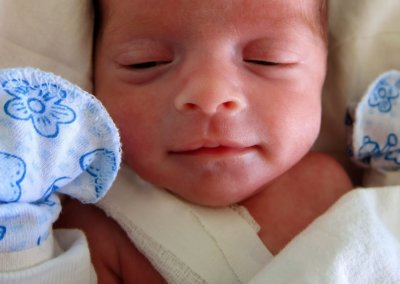A baby born at 21 weeks and one day has been confirmed to be the world’s most premature baby.
The Guinness World Records has confirmed that Curtis Means, born 19 weeks early, is the world’s most premature baby to survive. He was born weighing less than a pound with his twin sister C’Asya, who sadly died the following day.
Michelle Butler, his mother, went into labour on 4 July 2020 as the fireworks of Independence Day filled the night sky. The hospital said that it typically offers parents the opportunity to hold their tiny babies for what little time they are expected to have together.
However, baby Curtis clung on to life. Due to him being so underdeveloped, he had to be on a ventilator for the first three months of his life, but after 275 days in hospital, he was able to be taken home. Therapists have had to help him learn how to breathe and use his mouth to eat.
Mrs Butler, of rural Eutaw, Alabama, said in a statement: “Being able to finally take Curtis home and surprise my older children with their younger brother is a moment I will always remember”.
Curtis, now 16 months old, still needs supplemental oxygen and a feeding tube, but otherwise he is in good health.
Dr Brian Sims, the University of Alabama at Birmingham neonatologist who oversaw the delivery, told Guinness World Records: “I’ve been doing this almost 20 years, but I’ve never seen a baby this young be as strong as he was. There was something special about Curtis”.
Curtis cut 24 hours off the previous record, which was held by Wisconsin baby Richard Hutchinson, who was born a month beforehand at 21 weeks and two days.
Born before the abortion limit
In an occurrence that is becoming more frequent, Curtis was born almost 3 weeks before the abortion limit in the UK. In October last year, another severely premature baby was born in Scotland almost 2 weeks below the abortion limit. Sofia Viktoria Birina weighed only 500g, but by February this year, she was healthy enough to be sent home with her parents.
Baby Curtis and baby Sofia are not alone in being born so prematurely and going on to survive. A study published in the Journal of the American Medical Association in October 2019 followed 2.56 million babies born in Sweden between 1973 and 1997, around six percent of whom were born prematurely.
Researchers compared the health data of the premature babies to those that had been born at full term. They found that 55% of premature babies had no serious chronic, physical, or mental health issues by early adulthood. This is compared to 63% for babies born at full term.
Additionally, with each passing decade, the odds of survival for a premature baby to adulthood have improved from about 91% of babies born in the 1970s to about 96% of those born in the 1990s.
Right To Life UK spokesperson, Catherine Robinson, said: “These wonderful stories of premature babies going on to survive are becoming almost common-place. How long will it take our lawmakers to re-examine our cruel abortion laws that permit abortion even after the point at which babies are able to survive outside of the womb?”
“Of course, babies who cannot survive outside the womb have the same dignity and worth as the babies that can, and their lives should not be ended either. But the fact that more and more premature babies are going on to survive undercuts one of the main reasons given for our current abortion law”.












